This note is specifically for people on a ketogenic low carb diet and is referring to “nutritional ketosis” or the process of burning ketones for fuel/energy instead of glucose for both weight loss and health benefits.
Topics Today:
– What IS a ketone?
– What should my blood ketone levels be on a keto diet?
– When should I test my ketone levels?
– Blood Ketone Testing vs Urine Ketone Tests
– 4 ways to increase/improve your ketone levels
– Things that affect your ketone levels
– Why should you test your blood glucose levels?
If you’ve known me for ANY amount of time, you already know I’m BIG on keeping it simple and not over-complicating the keto diet – but rather relaxing into a healthy, active low carb lifestyle and enjoying the results & benefits.
Today we’re going to talk about science though, and lack of science, what’s REALLY going on with your body, how to know – then what to do about it.
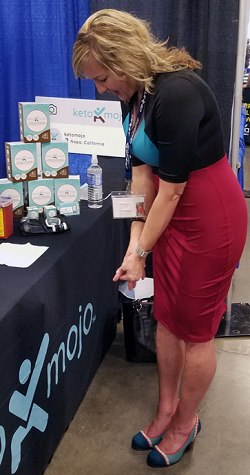 Why now?
Why now?
Because over the last year I’ve had some weird issues & symptoms in my own keto journey, specifically after a 4-month round of antibiotics & steroids that seemed to throw my body out of whack about a year and a half ago.
I realized two things while I was at KetoCon in June.
First, that I had just “accepted that” and allowed it to become my new norm.
I realized I needed to get proactive about my goals and my RESULTS again! Instead of just accepting “this is how it is now.”
Which is exactly what I did.
I actually stopped & dropped for a quick workout on the spot, to kick-start my exercise motivation again, even.
The second thing I realized is…
There’s a HUGE depth of information and science and personal experiences starting to bubble out of the keto community. Enough so to make your head spin after three full days at a Keto Conference – lol. 😛
I’m going to attempt to “keep this simple” in my usual fashion, and share with you what I learned by “going down the rabbit hole” myself to learn more about the role Ketones play in our body on a ketogenic diet – so you don’t have to spend hours wading through all that conflicting information yourself. 😉
Knowing I was having some strange issues, I started a clean testing experiment series earlier this year. And so of course the Keto Mojo booth was one of my first stops at the Keto Con event.
This is where I had my glucose and ketone levels tested for the first time…
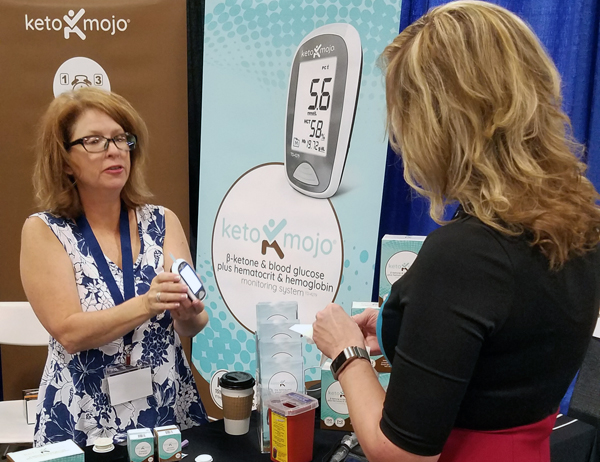
I signed up for their affiliate program so I could get you a discount. This link has your 15% off discount coded into it: Get 15% off the Keto Mojo Testing Meter. Their commission structure is weird/low but scoring us a discount was the big WIN! 😉
I had not eaten yet that day when she performed the glucose & ketone test on me, and the results showed pretty much what I suspected:
I was in ketosis, but on the low end with a 0.6 reading.
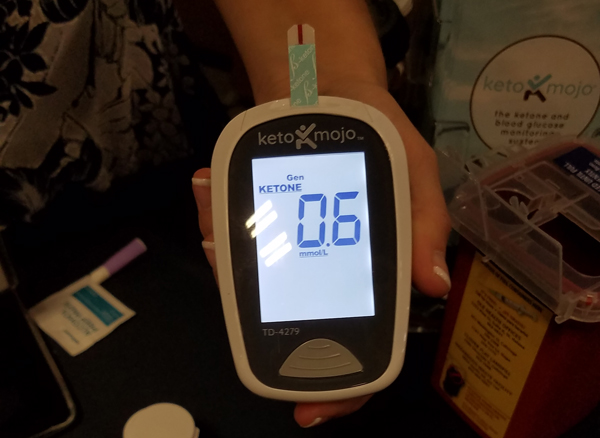
Or so I thought at the time…
Before we dive in, let me answer the quick question: What IS a ketone? – because as much as I thought I knew (lol) this was VERY interesting to me:
“a ketone is simply a water soluble fat that can be used for energy. The best ketones are the ones you make yourself from your fat stores and/or your diet.” –source
Meaning: not artificial ketones ingested through magic pills & potions.
What should your blood ketone levels be on a keto diet?
What I’m learning about Ketone levels is that … there are no definite answers. 🙂
There’s no perfect number or one-size-fits-all answer to the BIG question: what should MY ketone levels be? You do want to have at least 0.5 mmol/L reading which means you are IN ketosis.
Anything above that number (0.5) is where things seem to get interesting!
“The nutritional ketosis optimal zone is between 0.5 to 3.5 According to Dr’s Jeff S. Volek Phd, RD and Stephen D. Phinney MD, Phd Authors of The Art and Science of Low Carbohydrate Living.” -from the Keto Mojo site
All the different factors, all the different tests, all the different potential interpretations of the results, etc (example) can be overwhelming and complicated.
I encourage you NOT to go down that rabbit hole. 😛
The bottom line after reading endless websites and case studies, is that 0.5 or higher is ideal for weight loss and improved athletic performance. Meaning, you at least want to be IN ketosis (at 0.5 mmol/L) and everything else is a variable.
Most “experts” seem to agree that the 1-3 range is ideal, but that there is NOT enough science-based evidence to back any specific claims.
There are too many variables and no real clinical testing.
There are also cases mentioned like Sami Inkenen (a triathlon world champion) with a reading at .6 and optimal energy and health. That reading was while he was rowing between US and Hawaii – and I have no idea if the reading was before, after or during his athletic performance.
On that note:
“Your absolute ketone levels tell you nothing about how well you are a) making ketones b) using ketones, or c) retaining ketones (i.e. preventing wasting via the urine). The number you measure is just a balance of all three. So you could be running purely on ketones but using everything you make, and end up with “low” levels – Sami Inkenen is a good example.
There’s no such thing as an optimal recommendation for everyone because we just don’t know how to measure or understand all those processes as much as we’d like to think we do!” – Tommy Wood, Chief Medical Director at Nourish Balance Thrive
It’s less about what’s right and wrong, and more about what’s right for YOU personally. There are so many variables at play, such as: how long you’ve been in ketosis, how efficiently your body produces/uses ketones, whether you are active or sedentary, etc.
This is where testing comes in. To determine your baseline numbers, comparing your results/readings to how you FEEL and perform, and finding your sweet spot with it all.
When should you test your ketone levels?
My lower blood ketone test results that I showed you in my last post, plus the one taken at KetoCon above, were both “morning results” – which I discovered is normal.
Your first blood ketone test taken an hour or two after waking up, or before eating, will be your lowest reading: the time of day when your ketone levels are lowest.
On the Keto Mojo site they say: “We like to test our ketones first thing in the morning before breakfast, as generally, they are at their lowest, and that gives you a baseline for the day. The second time for testing is just before our evening meal when generally they are at their highest.”
After reading that, I performed an evening test before dinner yesterday:
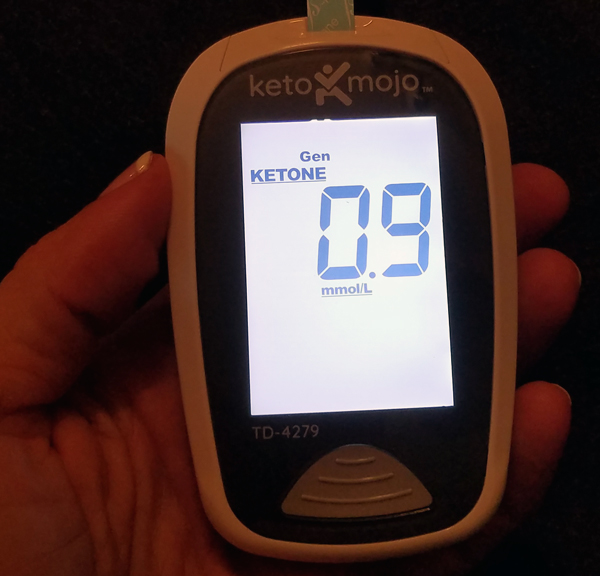
I was happy with those results.
But I’m also interested in improving them…
And in learning/experimenting more!
Blood Ketone Testing vs Urine Ketone Tests
To make all of this even MORE interesting, I have also been using urine test strips to monitor the ketone levels in my urine.
My urine ketone test shows higher levels of ketones, usually a darker reading in the moderate-to-large range.
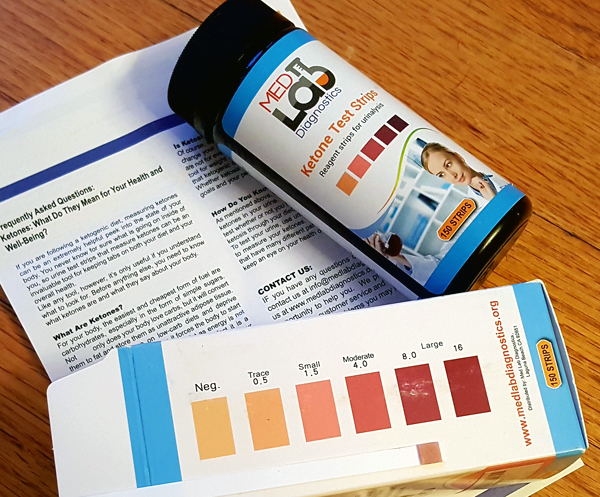
I use Med Lab Diagnostics Ketone Strips and you can read why here.
What’s the difference?
A blood test tells you the ketone levels IN your body (in your bloodstream) right now. Urine ketone tests, the strips you pee on, only test the levels of excess acetoacetate your body is excreting.
Meaning not what your body is running on, but what your body is getting rid of (waste).
Also, the keto urine strips only measure acetoacetate levels, which is an unused ketone by the body. There are three different types of ketones in your body, and the only way to know your true ketone level is through a blood test.
There are a lot of other variables with urine strips as well such as electrolyte and hydration levels, medications and vitamins, and how efficiently your body is at USING the ketones it produces (meaning: less waste, resulting in lower urine test readings).
My Biggest Take-Aways From This So far…
I find it most interesting that my blood ketone levels are on the lower end, while my urine ketone levels are on the higher end. This doesn’t bother me or perplex me – my results are fine/good as far as saying I am indeed in ketosis.
What interests me most is improving those numbers, or experimenting with improving/changing them, and seeing how I FEEL as a result – or what the results are from those changes exactly.
It does require consistent testing to figure out your baseline numbers, because the truth is: that’s going to be different for everyone and for every BODY.
From there you can figure out IF you need to improve those numbers, with a specific goal: better/faster weight loss, higher energy levels, better athletic performance/endurance, less chronic pain/inflammation, etc.
Things that affect your ketone levels, and things ketone levels affect.
What can make your ketone levels lower or higher? This has been interesting to me! Certain foods of course, medications, exercise, fasting (intentional or not), and even GUT HEALTH.
We’ve been talking about how stress can affect your gut health, which can affect your mood & energy, all of which can also affect your ketone levels I’ve learned.
All things are leading back to the gut everywhere I look lately! 😉
Stress can affect your gut health, your gut health can cause stress/depression, gut health affects ketone levels – which can affect EVERYTHING.
4 ways to increase / improve your ketone levels
The first question that popped into MY mind was: “should you try to increase/improve this number??” I wasn’t sure. I’m still not 100% sure. But I do want my body running at optimal health, and I now have the tools to experiment and test various things for better RESULTS: improved mood, more energy, weight loss, etc.
In all my reading I learned that there are four methods for increasing your ketone levels for optimal weight loss & energy.
It boils down to what I like to call “Food, Fasting, Fake, Fit” – or:
1. Ketogenic Diet
2. Intermittent Fasting
3. Taking Exogenous Ketones
4. Exercise
These are the four things that affect your ketone levels.
First, I had NO idea that exercise (or lack of it) would have any impact on the ketone levels in your body, so that was fascinating to study! I enjoyed this article: Optimize your exercise to burn fat and utilize ketones for example.
I’m still doing more research on the best exercises on a keto diet, and for optimal ketone production, so stay tuned as I wade through all the articles out there!
From what I’ve gathered so far it seems like a steady increased heart rate like walking, hiking and swimming are ideal as well as core/strength training – vs high intensity workouts (not ideal). But I’m still researching the effects/impacts etc, so more on that coming soon…
“Exercise has long been known to increase ketone production, even in people without diabetes. Increases in fat mobilization and increased blood flow to the liver during exercise promotes increased fat uptake to the liver and the conversion of fat first to acetyl-CoA and then to the ketone body acetoacetate. Acetoacetate can then convert to the two other ketone bodies – acetone and beta-hydroxybutyrate. These ketone bodies then leave the liver and can be used by muscle as energy.” – source
The first point above was obvious, BUT I did learn an interesting fact in my research. Something I probably should have known already. 🙂
Regarding MCT grade coconut oil (or MCT Oil) that people cook with, add to their coffee, eat by the spoonful, etc:
“MCTs are a type of saturated fat that goes straight to the liver after digestion. In the liver, these fats tend to be converted into ketones and sent to the cells in your body that need them for energy.” –source
As for Exogenous Ketones, those are highly debatable – and most of what you see on the market right now is SUPER SKETCHY. As said above, the best ketones are those your body produces itself.
That said, Ketologie came out with a brand new Ketones + Probiotics Pineapple Drink that is both for gut health (!) and to increase your ketone levels – plus focus, energy & electrolyte levels.
I have some of this, so I’m going to try it along with the rest of my experiments!
That ^ is the ONLY exogenous ketone type product I would TRUST – period.
—
Going back to point #1, obviously one of the bigger factors to your ketone levels will be the foods you are eating. Different foods affect different people in different ways…
Why should you test your blood glucose levels?
I was told that a glucose reading of about 83 is ideal. But the real key to the Blood Glucose Testing part of the KetoMojo test meter is that it allows you to find out which foods spike your glucose – which in turn lowers your ketone levels.
From the Keto Mojo site:
“Testing your glucose is a good indicator of a food trigger, as blood sugar changes far more rapidly than ketones. Ketones are slow to move and sometimes its what happened the day before that matters most.
Also, some people see a spike in glucose when using artificial sweeteners, while others don’t. Knowing if an artificial sweetener, or almond flour, or some other “substitute” ingredient is causing glucose spikes is important. These spikes can sabotage your keto scores.
In such when investigating foods our sleuthing tool is the glucose test.”
Having the blood glucose testing option with your KetoMojo Ketone Meter is ideal so you can identify your own food culprits, and how things affect YOU personally.
Are There Any TRUE Answers?!
I personally found it frustrating that there weren’t any cold hard facts or “true numbers” to base things on, but the fact is there simply isn’t any real scientific or clinical data available yet.
So the best thing we have is the tools to learn more about our own bodies, and tools that allow us to improve the performance and results.
The only REAL thing you need to know is if you are IN ketosis, which a blood ketone reading of 0.5 or higher – or any positive reading on a urine strip, which is way less accurate but a start at least.
From there, if you aren’t experiencing any health issues or long-term weight loss stalls/gains, my advice is: don’t worry about it! Keep it simple. 😉
If you ARE experiencing problems or weird issues/symptoms, like I have been over the last year, then it’s time to dig in and figure out what’s going on – and how you can fix that problem.
What Should I Test First?
I’m excited to dig in and do some serious testing now that I’ve figured out my base levels. Keep in mind that I have been eating low carb (or “eating keto”) for a VERY long time – more than 7 years now.
I wasn’t always as consistent as I am now, but for the last few years I’ve been consistently in ketosis – outside of the 2 or maybe 3 times a year I knock myself out of ketosis intentionally for testing purposes, and still with a low carb / paleo meal (a whole-food carb-up).
Anyway, armed with all this cool & interesting new information, I’m anxious to start testing a few things!
On my list of things to test are:
* MCT coconut oil
* The Ketologie pineapple drink
* Different types of exercise
* A keto carnivore diet (meat only, maybe 3 day experiment)
* And of course: Keto Products. 🙂
I would love to hear what YOU most want to see me test first, or what you’ve tested on yourself and what YOUR results were.
I think it would be easiest to start with the coconut oil and simply adding a TBSP a day for three straight days and monitoring the results.
From there I would love to test higher levels of MCT, and whether that impacts the results. Testing the keto products I love will be FUN of course (smile!) and I think I’m highly interested in the results of a Zero Carb / Carnivore experiment.
* If you want to learn more about Blood Ketone Testing and Glucose Testing, or the KetoMojo Testing Meter I’m using myself, check out the Keto Mojo Videos & Guides on their website.
Those are VERY helpful!
Thoughts / Questions?
I’m curious if you test for ketosis, test ketone levels, what you use – and what your thoughts / questions / experiences are on the topic?
Let’s discuss! 🙂
Best,
Lynn Terry,
aka @LowCarbTraveler
p.s. I got us a 15% discount on the Blood Glucose & Ketone Meter I’m using myself. The discount is coded into that link, so you’ll get 15% off automatically.
It’s already the most affordable and most accurate ketone/glucose testing kit available for the keto community, so another 15% off is a sweet deal!
All material provided on this site is intended for informational purposes only and should not be used to replace professional medical advice. Please consult your physician before starting any diet or exercise program.





Discount Code: LOWCARBTRAVELER
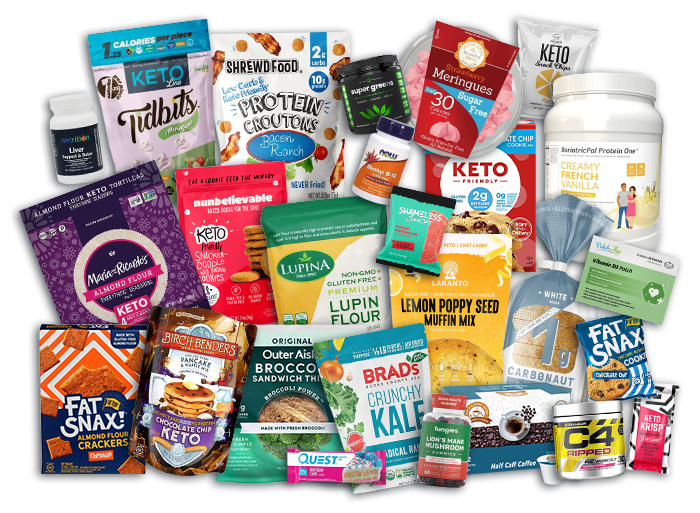
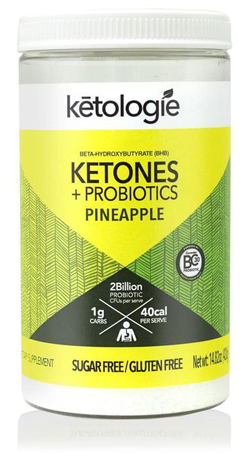
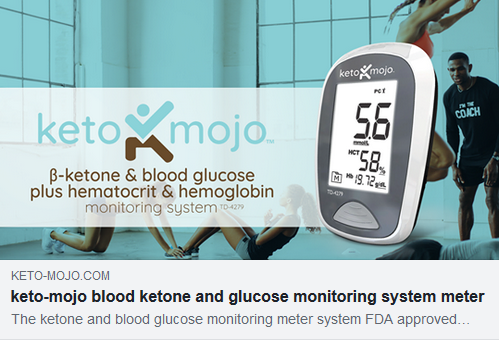



Interesting, how will you add coconut oil once per day? I have a hard time taking a spoonful. How about coconut oil capsules? Would they work? Thanks.
I haven’t looked at the capsules so I’m not sure on that. I was just thinking on it last night actually… I would either add it to my coffee (ie BPC, or Bullet Proof Coffee) or the easier way would be to mix it with peanut butter & freeze for tasty little bites. 🙂
I would just mix it with a stronger ratio of coconut oil to peanut butter and melt it together and put it in a square candy mold to make the taste & texture EASY.
Like this fudge recipe, but I wouldn’t add any sweetener or vanilla (I don’t usually anymore anyway): https://www.travelinglowcarb.com/6247/low-carb-peanut-butter-fudge/
I might test both – having a tbsp in a coffee with butter & cream, and using the peanut butter mix – to see if there’s any difference.
You should do the exogenous ketones first! I’m very interested in if they actually do anything. I’ve tried them on and off, but never regularly. I’ve read both schools of thought on the topic:
1. that they help by quickly putting your body into ketoisis and that it’s easier for your body to stay in ketosis because it is looking for that fuel type from that point on
2. that taking ketones exogenously prevents the body from producing them endogenously because the body sees them coming in and thus doesn’t need to produce them.
Two of my trusted keto sources (Dr. Eric Berg and Thomas DeLauer) don’t recommend taking them. BUT, I’d be very curious to see what you come up with if you experiment with them. Good luck!
Jen. My thoughts exactly. If you take in extra fats then why would your body draw from its own fat stores. If weight loss is your goal then I’d think taking in extra ketones would defeat your purpose. For athletes of course who rely on ketones for energy this would be ideal. It takes longer for our bodies to convert our stored fat for energy than if you in jest ‘ instant’ ketones
I have studied this for some time now
I did the original Atkins diet and also I am a nurse. There is really a science to all of this
I lost the most weight always on a low carb low fat diet where your body had to use its own store if ketones—- not added ketones.
All these products can sabotage your weight loss efforts. Believe me. I know. Eating clean. Works best. Real food. My opinions only. All the low carb products are helpful in maintenance mode. But if you are serious about losing weight. At least for me. It’s very low carb low or no fat. That is just what works for me. Everyone is different
Gina,
There are tons of articles that explain the science behind ketosis and/or a LCHF (low carb, high fat) diet, but this one explains it simplest to me:
“Fat Burns Fat
The body needs three macronutrients for energy: Carbohydrates, protein, and fat. A gram of fat packs more than twice the energy of a gram of the other two. “When you don’t have any fat in your diet its like you don’t have fuel to burn calories,” Glassman says. The body requires energy to keep its metabolism properly functioning, and a 2007 study published in the American Journal of Clinical Nutrition found that consuming fatty acids can boost metabolic health.
What’s more, “old” fat stored in the body’s peripheral tissues—around the belly, thighs, or butt (also called subcutaneous fat)—can’t be burned efficiently without “new” fat to help the process, according to researchers at Washington University School of Medicine in St. Louis. Dietary fat helps break down existing fat by activating PPAR-alpha and fat-burning pathways through the liver.
Think of mealtime like baseball spring training: young, hungry players (new fat) hit the field and show the general manger (the liver) that it’s time to send the old, worn-out players (subcutaneous fat) home. And away they go.” –source
That just made me MORE nervous about testing those, Jen! 😛 haha
Well, I’m confused! :). I add 2 TBSP of coconut oil to my “cereal” (yogurt, pecans, strawberries), (I use yogurt instead of cottage cheese, still 1/4 cup) every morning. So is adding coconut oil a good thing or a bad thing? The whole Keto diet to my understanding was to eat more oil?
I have a Precision Xtra Blood Ketone Meter, have had one for about a year now, when I’m in Ketosis (I’m not now, :(, didn’t have one glass of wine for 6 months but started drinking wine again and it kicked me out), but when I was in Ketosis it usually read from 0.5 to 1.2, averaging 0.7 to 0.9 with a high of 1.2. I have the opposite experience than you with the test strips? They show me out of ketosis, when the blood meter shows 0.5?
So again, should I be adding coconut oil to my breakfasts every morning or is that not a good thing??
Thanks SO much Lynn for all of your reading and research for us, I do appreciate it.
Best,
Roye
Hi Roye 🙂 It’s always great to hear from you!
The coconut oil is fine if 1) you are IN ketosis, or 2) you are trying to GET into ketosis. If you are OUT of ketosis and know you are going to be, meaning you are not in fat burning mode and not working toward that, you don’t want to add the extra fat to your diet while your body is running on carbs/sugar.
But yes, in general, on a ketogenic low carb diet including MCT oil is a GOOD thing. 🙂 I hope that made sense!
Hi Lynn, great talking to you too, thank you for your reply. And well yeah! DUH lol, of course I shouldn’t be eating more fat if I’m not burning fat. I was doing so good! :(, lost 25lbs since Jan, but have fallen off with the vino. I’ll get back to it soon I hope. Too bad I can’t lose and drink wine, it’s not fair. :).
Thanks again for all you do!
Thank you & you’re welcome! 🙂 There IS low carb and keto friendly wine. That’s something you should look into!!
Thanks again Lynn, I won’t keep laboring the issue :), but I do drink a low carb red wine; Cabernet Sauvignon, about 3.5 to 3.8 g of carbs per 5 ounce serving. Trouble is I don’t have just one serving :-O. And I understand the issue is when you drink alcohol your body burns that first before it starts burning fat. So I don’t really gain weight but I don’t lose any either when I’m partaking :).
Ah, gotcha – but it also throws you out of ketosis, yes??
Had to hit reply here, didn’t see a reply under your last post. And yes I’m assuming that’s what’s doing it, I’m still eating LC. Just tested with the blood meter and I’m at 0.4. And Oh My those testing strips are so expensive!
I think there is a limit to the nested comments. 😉
Have you ever done a “clean test” on the wine to see if that’s what is throwing you out of ketosis – or could there possibly be another culprit?
Do you also do blood glucose testing to see if the wine spikes your levels – affecting your ketones?
The KM strips are comparable in price to any other on the market, but what I like about them is that they’re made & shipped from within the USA. Since they are temp sensitive, they are much more reliable than say something you get that is made and shipped from overseas – which the majority are.
I’m thinking it’s the wine but no I’ve never really done a clean test to see. Plus since I’m out of ketosis, I’ve been bad now with the food too….sigh sigh sigh. I just need to get back on track. I will, I will.
Thanks so much Lynn for all your help. You’re so good, I don’t know how you keep up with everyone and all you do. It’s appreciated!
Thank you, Roye. Because I enjoy it!! 🙂
You feel best when you’re eating good and losing weight, right? Losing 25 pounds earlier this year was awesome!! I’m sure it FELT awesome too.
That’s good motivation. 😉
What is the best time to check your blood glucose to see if a certain food is spiking your blood sugar?
Great question, Traci – I’m glad you asked because I should have included that information in the section on glucose testing. 😉
According to the KetoMojo site: “before a meal and at 40, 80 and 120 mins after eating to see what foods can make a difference.”
definitely interested in seeing your response to carnivore diet!
Me too, Connie! I have visions of ribeyes and chopped steak and pork chops that make me 🙂 🙂 🙂 smile. haha!
I’ve been following a fun group of “keto carnivores” on Twitter for awhile now and enjoy what they share.
It’s not something I need to do as a lifestyle or for therapeutic reasons (for health benefits) as keto alone – eating super low carb & high fat – works for me. But it may be a great way to increase my ketone production again. 😉
I’m really interested in the Ketone numbers… from your tests. I’m diabetic so I’m used to tracking glucose but have never tracked or looked at ketones before.
Obviously everyone is very different, but it will be interesting to see what patterns emerge for you. And I just ordered the Keto test strips .Thanks for the awesome coupon!
Great, you’re welcome! The KetoMojo testing kit is FDA approved for diabetic use, btw. The information about exercise producing ketones came from a source on diabetes actually – but I’m guessing being diabetic, you’re already familiar with how all that works, more so than someone who’s not. 😉
Hi Terry–I have been low carb since i started your challenge in aug 2016. Thaks for all the help and in my success. That being said, I started at 190 lbs and hit my lowest weight in feb of 2017 at 157. I went on a cruise at that time and of course didnt stay on track. Since feb 2017, I have literally stayed between 166 and 163 with 1 low point of 161. I have been back in strick ketosis for almost 2 weeks now and still no loss. I have added 35-40 minutes cardio 5 days a week and still no loss. Is it remotely possible for my body to decide where I should be in weight? I hope not. I have been trying to lose 10 lbs this whole year with no luck. Thanks for all you do! Hoping to find an answer 🙂 Tracie Wilkerson
Hi Tracie 🙂 Great to hear from you!
No, your body won’t get “stuck” – so you definitely want to figure out the culprit and get unstuck. 😉
First, how are you tracking? And are you doing 20 net carbs max and 70% fat minimum consistently? Or what are you doing/tracking exactly?
Also, did you take measurements and have you seen any change there, even with the scales barely fluctuating?
Let’s start there…
Thank you for your response! I am doing 20 net carbs using my fitness pal, I did take measurements and they have not changed either. No change in the way my clothes fit. I am not giving up lol. This week I am cutting out diet sodas and all artificial sweetners other than erythitiol and see if that helps. I looked back on my macros last month and it looks like i wasn’t meeting my 70% on fats and going over in my protein so maybe that is the hold up.
Keep in mind that adding cardio, or any exercise, will present itself as a stall or fluctuations on the scales – due to inflammation, muscle recovery, and body composition changes – burning fat but building lean muscle, etc.
Exercise is great though! 🙂
I think that’s a smart plan. Continue your current exercise routine and start cutting potential culprits. You might try cutting just diet soda first for one week, then the artificial sweeteners the next week, to test between the two. Or cut them both if you plan to ditch both anyway…
It’s a matter of clean testing to see what affects your weight loss, given everyone can have different tolerance levels to certain things. 😉
I can’t wait to hear the results!
I’d like to see more on carnivore and if there are any benefits or improvements worth switching to more meat..right now I feel better and less hungry with high fat moderate protein…I’m keto over 3 yrs but did one day carnivore and was starving the next day which I didnt like at all!..I just dont get hungry much on keto…good article!
Hi Angie,
The key with keto carnivore is that you still maintain a high fat ratio, which is easy enough to do. You don’t want to eat lean AND high protein, but rather fatty meats – and meat products, including dairy and eggs.
So salmon instead of whitefish or other seafood, tuna/sardines, ribeye instead of sirloin, chicken thighs & wings instead of breasts, etc. I’ve seen them use bacon grease, mayo, heavy cream, butter, eggs, etc too.
I have to look into it more, but I do know they’re maintaining a high fat ratio even with an all meat diet from what I can tell. 😉
Thanks for the reply..I felt like I kept it pretty high fat..sardines for lunch and double cheeseburger for dinner which I’m sure wasn’t lean ..I’m intrigued but at the same time keto works for me so idk…I’ll watch your experience if you do it..I’m following others and trying to learn..I do still have some gut issues so I thought it might help.
Ah, if keto is working for you – just stick with that! 😉 For gut health, which I am also researching, because I’m having some issues as well, here is what I’ve learned so far:
More green vegetables (the greener/darker the better). The fiber carries gut bacteria out of your body with it.
A probiotic. I picked up a high potency one at Walgreens and take it daily now.
Bone broth and Collagen. I like the Ketologie Roast Chicken Broth: https://www.travelinglowcarb.com/ketobroth because it already has the collagen in it. But both are supposed to be great for gut health.
We have a coupon code there, btw: TravelingLC for a discount on anything at Ketologie. This is my post/review on their products: https://www.travelinglowcarb.com/20357/ketologie/
good reminder, yea I will probably stick with keto, it’s been really great to get rid of my inflammation and I like not being super hungry and controlled by food. I actually work at a holistic medical clinic and also do these things you mentioned, rotating very potent probiotics, collagen, bone broth etc…I love it! We carry the perfect keto brand here so it’s easy for me to get… things just take time to improve after antibiotics as you know!…I love your traveling food ideas by the way they suit my style of low maintenance perfectly 🙂 I may try this ketologie brand though, thanks for the links!
I’m so glad it’s helpful, and very cool you have access to all of that!
And YES, getting my system straightened out after antibiotics and steroids last year has been a big issue and a top priority. 😛
I just got the MojoKeto Meter.
I love mine. 🙂 How are you liking it so far, Doris? Did you check out all the videos on their website? I found those VERY helpful!
So did I. Today is the first day testing it. 2.3 first thing this morning, and 1.2 after lunch. Is that typical?
If you read this article you already know there’s nothing “typical” 🙂 lol. But anything over 0.5 means IN ketosis, so those readings are totally fine.
Mine are lower consistently because I’ve been eating keto for so long now (ranging 0.8 to 1.2 usually) – your body will get more efficient and producing and using ketones over time from what I understand.
I just ordered the KetoMojo meter! I’m being a baby but I worry about the finger stick – but the video made it look pretty easy so I think I can do it! Hopefully this will get me back on track. Ive been trying so may different things but sticking to none. I just started with IF, so hopefully that paired with keto and some exercise will start working.
I was doing some Interval training (OrangeTheory Fitness) – is there an issue with that? Seems like lower intensity is what’s recommended…
Thanks!
Sarah
You’ll love it Sarah – it’s way easier than you think. 😉
Any exercise is fine. Some people don’t exercise, some do power lifting, some do cardio, some do body weights – exercise is healthy, just do what you enjoy!
Exercise is NOT for weight loss, by the way. It’s healthy, it FEELS GOOD, and it’s great for building lean muscle and toning your body.
I would suggest you STOP trying so many different things, and drop “dieting” altogether and keep it super simple instead: 20 net carbs max, 70% fat minimum, only eat when you’re hungry, stop when you’re satisfied (this often means I put food away for leftovers), and just relax into a healthy low carb lifestyle – and let weight loss be the natural result. 😉
Thanks Lynn!
I LOVE the Keto-Mojo and the finger stick is so easy. It’s so helpful to know whether you’re in ketosis or not…I can’t seem to get above 1.0 on the meter. I think I need to up my fat, because on average I log about 60%-70% fat (but usually in the 60’s). So I have to figure out a way to get more fat…maybe BPC, and pecans. I’m rarely hungry now, and eat only lunch and dinner. Waiting for my granola!
And yes – you are right. I think trying too many things and not sticking to one is definitely my problem. I think if I have some success, it will be easier and I’ll be more motivated to be consistent.
Also, I saw you were in Long Beach this weekend…I live close by! Wish we could have done a meet-up! I love your simple suggestions.
Thanks for all the advice. Keto on!
Sarah
I’ve had my meter for 2 weeks now, and I test every morning. I usually get a reading anywhere from 0.9 to 1.2. Sometimes I test later in the day and it’s usually still in that range, so I know I’m in ketosis. I’ve also been doing some days of intermittent fasting (16:8). However, I’ve only lost 3 lbs since starting back on Keto January 1st, and that happened in the first week. This is what I don’t understand: I have not given up alcohol (typically a couple glasses of red wine, or a few ounces of bourbon). How can I stay in ketosis and yet not lose any weight? I really enjoy my wine and hate the thought of giving it up.
Hello,
I check my ketones consistently, I have been in ketosis for about 2 months. For some reason it is harder for me to have the high numbers that I had when I first started the journey. I track all my food that I intake. I take mct oil and exogenous ketones and I get a lot of mixed results. I am just confused and not sure where to go. There is so much information out there. I keep my carbs down to about 25 to 30 grams a day. I still eat vegatables and I fry in Beef tallow and have switch most of my butter to ghee. Just not sure what else I have to go. I do take Lipitor and Xanax for sleeping but not sure if that has anything to do with it. I do have another question about when is the most optimal time to test? What is the best tester out there? Thanks in advance.